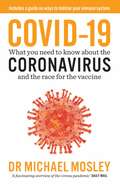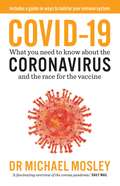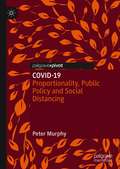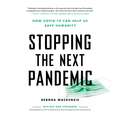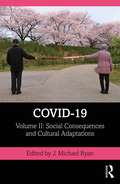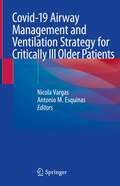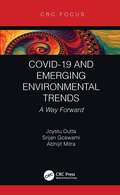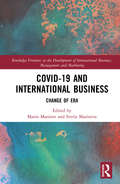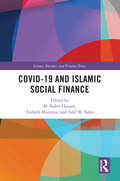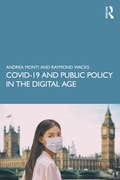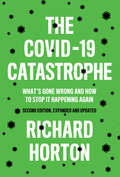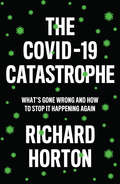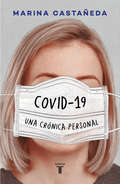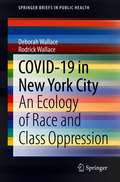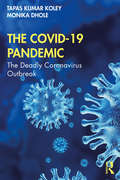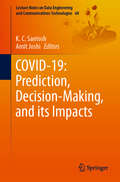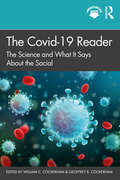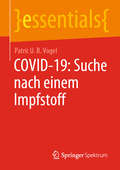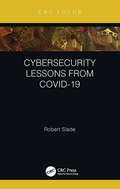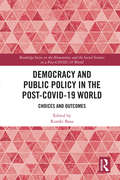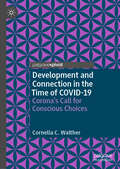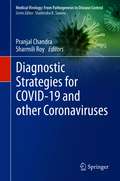Special Collections
Everything you ever wanted to know about the COVID-19 pandemic
- Table View
- List View
COVID-19
by Dr Michael MosleyAustralia and New Zealand edition From award-winning science journalist Dr Michael Mosley: The story of COVID-19, the greatest public health threat of our time ... This book charts the trajectory of a novel virus, from its emergence in China at the end of 2019 to its rapid worldwide spread. Based on the latest scientific discoveries, Dr Mosley provides a fascinating and detailed understanding of the secrets of this coronavirus, how it spreads, how it infects your body and how your immune system tries to fight back. With access to leading experts, he reports on the battle to find treatments and a safe and effective vaccine (ultimately, the only way to defeat the virus). Armed with the facts about COVID-19 you’ll be in a better position to protect yourself and your family as the world begins to reopen. Eating well, sleeping soundly, exercising and managing stress are all vital for keeping your body and immune system in the best possible shape to fight the virus. These are areas where Dr Mosley, creator of the 5:2 diet, is well known for his science-based and practical approach. ‘This is an incredibly readable summary of the latest research. A magical mixture of scientific realism and reasoned hope.’ Dr Mathew Vadas, Professor of Medicine and leading immunologist, Centenary Institute and University of Sydney
COVID-19
by Dr Michael MosleyDiscover the most essential and comprehensive information about the coronavirus (COVID-19) pandemic, how to ward off infection, and safeguard your mental and physical health during isolation—from the award-winning science journalist and #1 New York Times bestselling author of The Fast 800 and The FastDiet. Dr. Michael Mosley has experienced the effects of coronavirus firsthand, as he and both his sons—medical professionals in their twenties—all became ill during the height of the pandemic in London. Now recovered, Dr. Mosley shares his insights and explains the science behind the greatest public health crisis of our time. From the emergence of the novel virus in China at the end of 2019 to its rapid worldwide spread, this clear, detailed guide provides you with a basic understanding of the virus, how it jumps from person to person, how it can be overcome, and the most effective ways to protect yourself and your family. Featuring in-depth interviews with leading doctors and virus researchers working on the front lines to defeat this microscopic enemy, COVID-19 also tracks the ongoing developments in finding new treatments and an effective vaccine—the only way to ultimately halt the spread of the virus. Offering highly readable, easy-to-digest information about this global pandemic, Dr. Mosley&’s COVID-19 is the ultimate resource to help you feel better informed and take care of yourself as we all work through this global crisis.
COVID-19
by Peter MurphyCOVID-19: Proportionality, Public Policy and Social Distance explores the social and political response to the COVID-19 pandemic. It details the sociological aspects of the spread of the virus, the role played by social distancing in virus mitigation, and the comparative effect of social proximity and distance on national anti-viral behavior. Peter Murphy discusses various public policy approaches to the pandemic and their successes and failures. In this engaging analysis, he investigates the way that contemporary societies think about risk, threat and harm, and how social mood affected the response to COVID-19.
COVID-19
by Debora MacKenzieIn a gripping, accessible narrative, a veteran science journalist lays out the shocking story of how the COVID-19 coronavirus pandemic happened and how to make sure this never happens againOver the last 30 years of epidemics and pandemics, we learned nearly every lesson needed to stop this coronavirus outbreak in its tracks. We heeded almost none of them. The result is a pandemic on a scale never before seen in our lifetimes. In this captivating, authoritative, and eye-opening book, science journalist Debora MacKenzie lays out the full story of how and why it happened: the previous viruses that should have prepared us, the shocking public health failures that paved the way, the failure to contain the outbreak, and most importantly, what we must do to prevent future pandemics.Debora MacKenzie has been reporting on emerging diseases for more than three decades, and she draws on that experience to explain how COVID-19 went from a potentially manageable outbreak to a global pandemic. Offering a compelling history of the most significant recent outbreaks, including SARS, MERS, H1N1, Zika, and Ebola, she gives a crash course in Epidemiology 101--how viruses spread and how pandemics end--and outlines the lessons we failed to learn from each past crisis. In vivid detail, she takes us through the arrival and spread of COVID-19, making clear the steps that governments knew they could have taken to prevent or at least prepare for this. Looking forward, MacKenzie makes a bold, optimistic argument: this pandemic might finally galvanize the world to take viruses seriously. Fighting this pandemic and preventing the next one will take political action of all kinds, globally, from governments, the scientific community, and individuals--but it is possible.No one has yet brought together our knowledge of COVID-19 in a comprehensive, informative, and accessible way. But that story can already be told, and Debora MacKenzie's urgent telling is required reading for these times and beyond. It is too early to say where the COVID-19 pandemic will go, but it is past time to talk about what went wrong and how we can do better.
COVID-19
by J. Michael RyanThe SARS-CoV-2 virus, and the associated COVID-19 pandemic, is perhaps the greatest threat to life, and lifestyles, the world has known in more than a century. The scholarship included here provides critical insights into the institutional responses, communal consequences, cultural adaptations, and social politics that lie at the heart of this pandemic. This volume maps out the ways in which the pandemic has impacted (most often disproportionately) societies, the successes and failures of means used to combat the virus, and the considerations and future possibilities – both positive and negative – that lie ahead. While the pandemic has brought humanity together in some noteworthy ways, it has also laid bare many of the systemic inequalities that lie at the foundation of our global society. This volume is a significant step toward better understanding these impacts. The work presented here represents a remarkable diversity and quality of impassioned scholarship and is a timely and critical advance in knowledge related to the pandemic. This volume and its companion, COVID-19: Volume I: Global Pandemic, Societal Responses, Ideological Solutions, are the result of the collaboration of more than 50 of the leading social scientists from across five continents. The breadth and depth of the scholarship is matched only by the intellectual and global scope of the contributors themselves. The insights presented here have much to offer not just to an understanding of the ongoing world of COVID-19, but also to helping us (re-) build, and better shape, the world beyond.
Covid-19 Airway Management and Ventilation Strategy for Critically Ill Older Patients
by Antonio M. Esquinas and Nicola VargasThis book describes the issues and challenges that clinicians encountered in the management of older critically ill patients during the Covid-19 pandemic, and offers practical information on how to manage them. Older adults are more susceptible to complications such as acute respiratory distress syndrome (ARDS) as a result of viral pneumonia. In addition, they often have multiple comorbidities and are commonly frail, which means their various organs and systems, such as the respiratory system, have reduced functional reserves. As such, older adults are less able to react to acute stressors. During the current Covid-19 pandemic, older adult patients' mortality is increased. Further, the infection and death rates of elderly people in nursing homes and health care institutions are high.Management of older adults with Covid is complicated. The reduced availability of beds may limit their access to ICU. Moreover, the prognosis may be poor, and airway management and ventilation strategies have to take into account various clinical and physiological characteristics specific to older patients. This book is addressed to all allied professionals involved in the management of older critically ill patients and presents information collected and practical lessons learned from the clinical daily management of this population during the pandemic.
COVID-19 and Emerging Environmental Trends
by Abhijit Mitra and Joystu Dutta and Srijan GoswamiThe extensive safety restrictions imposed globally due to the COVID-19 pandemic have brought significant changes to almost all environmental parameters. The largest pandemic of the century has left an indelible mark on all aspects of human life and the environment. This book revolves around COVID-19 and its influence on all biotic and abiotic components on earth, with a focus on the regulatory role of air quality during the pandemic, environmental toxicity and susceptibility to COVID-19, and the impact of the lockdown on different ecosystems. The book fundamentally explains the biology of SARS-CoV-2 and the pathophysiology and epidemiology of COVID-19. Dedicated chapters highlight the ongoing global cutting-edge research on COVID-19, control and safety measures, and public health concerns. COVID-19 and Emerging Environmental Trends: A Way Forward is aimed at graduate and postgraduate students as well as researchers in environmental and medical science, health and safety, and ecology. This book offers a multiperspective and multidisciplinary approach to the discussion of the pandemic as well as emerging environmental issues, current trends, and a way forward. As humanity stands face-to-face with the largest global crisis in recent times, this book helps readers to easily understand its various aspects from a beginner’s perspective, without going into the intricate technicalities of medical science or environmental science, and beautifully juxtaposes critical issues with lucid language and flexible scientific explanations.
Covid-19 and International Business
by Marin A. Marinov and Svetla T. MarinovaThe Covid-19 pandemic has induced a crisis grasping the world abruptly, simultaneously, and swiftly. As a critical juncture, it ignited a change of era for international business. This book illustrates how governments have dealt with the pandemic and the consequent impacts on international business. It also explores the disrupted operations and responses of businesses as their worldwide interconnectivity has been seriously threatened. The book discourses multidirectional aspects of the effects of Covid-19 on international business, ranging from the juxtaposing forces disrupting globalization and installing a change of era through decoupling of technological, production and knowledge flows to its stimulating aspects to the strategic response on business, industry and state level. The book contains thirty chapters that offer a multidimensional interpretation of impacts of Covid-19 on international business theory and practice. Employing the latest state of knowledge on the topic, the book is aimed at international business audience - scholars, students and managers who need to understand better the nature, scope and scale of the impacts of the pandemic on international business.
COVID-19 and Islamic Social Finance
by M. Kabir Hassan, Aishath Muneeza, and Adel M. SareaIt is said that the COVID-19 pandemic has turned back the poverty clock. As such, there is a need to have social mechanisms put in place to provide relief to those who are affected in this regard. Islamic social finance consists of tools and institutions that could be used to alleviate poverty. This book explores the impact of COVID-19 on Islamic finance to better understand the effectiveness of Islamic social finance in helping those who have been affected by poverty overnight due to the halt in all major economic activities in the context of the pandemic. Since the struggle against poverty in each country will be different, the book attempts to shed light on the experiences of different countries by presenting successful models of Islamic social finance. The book first looks at poverty and COVID-19 before delving into the role of Islamic social financial institutions and how they have risen against COVID-19. The book concludes by examining the impact of COVID-19 on Islamic microfinance. This book is the first of its kind on the subject of COVID-19, and it intends to bridge the gap in the literature.
COVID-19 and Public Policy in the Digital Age
by Raymond Wacks and Andrea MontiCOVID-19 and Public Policy in the Digital Age explores how states and societies have responded to the COVID-19 pandemic and their long-term implications for public policy and the rule of law globally. It examines the extent to which existing methods of protecting public safety and national security measure up in a time of crisis. The volume also examines how these ideas themselves have undergone transformation in the context of the global crisis. This book: Explores the intersection of public policy, individual rights, and technology; Analyzes the role of science in determining political choices; Reconsiders our understanding of security studies on a global scale arising out of antisocial behaviour, panic buying, and stockpiling of food and (in the United States) arms; Probes the role of fake news and social media in crisis situations; and Provides a critical analysis of the notion of global surveillance in relation to the pandemic. A timely, prescient volume on the many ramifications of the pandemic, this book will be essential reading for professionals, scholars, researchers, and students of public policy, especially practitioners working in the fields of technology and society, security studies, law, media studies, and public health.
The COVID-19 Catastrophe
by Richard HortonThis expanded, updated, and completely revised edition of The COVID-19 Catastrophe is the authoritative guide to a global health crisis that has consumed the world. Richard Horton, editor of the medical journal The Lancet, scrutinises the actions taken by governments as they sought to contain the novel coronavirus. He shows that indecision and disregard for scientific evidence has led many political leaders to preside over hundreds of thousands of needless deaths and the worst global economic crisis for three centuries. This new edition provides a systematic discussion of the pandemic’s course, national responses, more transmissible mutant variants of the virus, and the launch of the world’s largest ever vaccination programme. Only now are we beginning to understand the full scale of the COVID-19 crisis. We need to learn the lessons of this pandemic, and we need to learn them fast, because the next pandemic may arrive sooner than we think.
The COVID-19 Catastrophe
by Richard HortonThe global response to the Covid-19 pandemic is the greatest science policy failure in a generation. We knew this was coming. Warnings about the threat of a new pandemic have been made repeatedly since the 1980s and it was clear in January that a dangerous new virus was causing a devastating human tragedy in China. And yet the world ignored the warnings. Why?In this short and hard-hitting book, Richard Horton, editor of the medical journal The Lancet, scrutinizes the actions that governments around the world took – and failed to take – as the virus spread from its origins in Wuhan to the global pandemic that it is today. He shows that many Western governments and their scientific advisors made assumptions about the virus and its lethality that turned out to be mistaken. Valuable time was lost while the virus spread unchecked, leaving health systems unprepared for the avalanche of infections that followed. Drawing on his own scientific and medical expertise, Horton outlines the measures that need to be put in place, at both national and international levels, to prevent this kind of catastrophe from happening again. We’re supposed to be living in an era where human beings have become the dominant influence on the environment, but Covid-19 has revealed the fragility of our societies and the speed with which our systems can come crashing down. We need to learn the lessons of this pandemic and we need to learn them fast because the next pandemic may arrive sooner than we think.
COVID-19 Una crónica personal
by Marina CastañedaCon su particular humor y voz, Marina Castañeda hace un recorrido por su experiencia a partir del encierro por esta pandemia que ha sacudido al planeta entero. Con su mirada aguda reflexiona sobre distintos temas como la comunidad, la violencia de género o la discriminación. Tras una larga era de estabilidad que nos había permitido vivir en (relativa) paz y prosperidad, nos habíamos acostumbrado a la libertad -de movimiento, de expresión, de asamblea, de religión y de estilo de vida. Como parte de las clases medias que habían surgido desde la Segunda Guerra Mundial, podíamos pagarnos vacaciones, restaurantes, y comprarnos toda clase de bienes y servicios que antes eran de lujo. Nos habíamos vuelto consumistas e individualistas de ultranza. Nos habíamos desprendido poco a poco de nuestros lugares y familias de origen y de nuestros vecinos y barrios. Nos interesaba poco la población "invisible" que nos permitía vivir a gusto sin ocuparnos de las bases materiales de la existencia cotidiana. Pedíamos algo en línea y milagrosamente llegaba a la puerta de nuestras casas. Defendíamos nuestros derechos sin ocuparnos demasiado de los demás. Nuestros hábitos de habían vuelto una jaula de oro. El coronavirus cambió todo. Nos hizo recordar, o tomar consciencia, de muchas cosas que habíamos dado por sentadas: dependíamos de nuestros empleados de servicio, de nuestros vecinos, de todos los "invisibles", e incluso de las autoridades para imponer las medidas sanitarias indispensables, orientarnos y apoyarnos. Esta nueva forma de concebir los servicios públicos, como un gasto que debe cubrir cada ciudadano en lo personal, era el resultado de más de 30 años de recortes presupuestarios, gastos gubernamentales enfocados en la guerra contra el narco, apoyos a los bancos y grandes empresas. El coronavirus no hizo más que sacar a relucir este abandono por parte del gobierno de sus funciones más esenciales. De pronto nos descubrimos huérfanos. Lo único que podremos esperar es que habremos aprendido sus grandes lecciones. Ojalá lo hagamos mejor la próxima vez.
COVID-19 in New York City
by Rodrick Wallace and Deborah WallaceThis book is the first social epidemiological study of COVID-19 spread in New York City (NYC), the primary epicenter of the United States. New York City spread COVID-19 throughout the United States. The context of epicenter formation determined the rapid, extreme rise of NYC case and mortality rates. Decades of public policies destructive of poor neighborhoods of color heavily determined the spread within the City. Premature mortality rates revealed the "weathering" of policy-targeted communities: accelerated aging due to chronic stress. COVID attacks the elderly more severely than those under the age of 60. Communities with high proportions of prematurely aged residents proved fertile ground for COVID illness and mortality. The very public policies that created swaths of white wealth across much of Manhattan and parts of Brooklyn destroyed the human diversity needed to ride out crises. Topics covered within the chapters include: Premature Death Rate Geography in New York City: Implications for COVID-19 NYC COVID Markers at the ZIP Code Level Prospero's New Castles: COVID Infection and Premature Mortality in the NY Metro Region Pandemic Firefighting vs. Pandemic Fire Prevention Conclusion: Scales of Time in Disasters An exemplary study in health disparities, COVID-19 in New York City: An Ecology of Race and Class Oppression is essential reading for social epidemiologists, public health researchers of health disparities, those in public service tasked with addressing these problems, and infectious disease scientists who focus on spread in human populations of new zoonotic diseases. The brief also should appeal to students in these fields, civil rights scholars, science writers, medical anthropologists and sociologists, medical and public health historians, public health economists, and public policy scientists.
The COVID-19 Pandemic
by Tapas Kumar Koley and Monika DholeThis volume presents a comprehensive account of the COVID-19 pandemic, also known as the novel coronavirus pandemic, as it happened. Originating in China in late 2019, the COVID-19 outbreak spread across the entire world in a matter of three to four months. This volume examines the first responses to the pandemic, the contexts of earlier epidemics and the epidemiological basics of infectious diseases. Further, it discusses patterns in the spread of the disease; the management and containment of infections at the personal, national and global level; effects on trade and commerce; the social and psychological impact on people; the disruption and postponement of international events; the role of various international organizations like the WHO in the search for solutions; and the race for a vaccine or a cure. Authored by a medical professional and an economist working on the frontlines, this book gives a nuanced, verified and fact-checked analysis of the COVID-19 pandemic and its global response. A one-stop resource on the COVID-19 outbreak, it is indispensable for every reader and a holistic work for scholars and researchers of medical sociology, public health, political economy, public policy and governance, sociology of health and medicine, and paramedical and medical practitioners. It will also be a great resource for policymakers, government departments and civil society organizations working in the area.
COVID-19: Prediction, Decision-Making, and its Impacts
by Amit Joshi and K. C. SantoshThis book outlines artificial intelligence for COVID-19 issues that are ranging from prediction to decision-making for healthcare support in human lives. Starting with major COVID-19 issues and challenges, it takes possible AI-based solutions for multiple problems, such as early prediction, its role for public health, detection of positive cases, drug analysis, and healthcare support. It mainly employs publicly available data (population) to predict who should be tested for COVID-19, for example, radiological image data to detect COVID-19 positive cases from other similar and/or different manifestations, such as pneumonia, distributed healthcare support, and supply chains in the middle of COVID-19 pandemic. The book includes recently developed AI-driven tools and techniques, such as pattern recognition, anomaly detection, machine learning, and data analytics. It covers a wide range of audience from computer science and engineering to healthcare professionals.
The Covid-19 Reader
by William C. Cockerham; Geoffrey B. CockerhamThis reader offers some of the most important writing to date from the science of COVID-19 and what science says about its spread and social implications. The readings have been carefully selected, introduced, and interpreted for an introductory or graduate student readership by a distinguished medical sociology and political science team. While some of the early science was inaccurate, lacking sufficient data, or otherwise incomplete, the author team has selected the most important and reliable early work for teachers and students in courses on medical sociology, public health, nursing, infectious diseases, epidemiology, anthropology of medicine, sociology of health and illness, social aspects of medicine, comparative health systems, health policy and management, health behaviors, and community health. Global in scope, the book tells the story of what happened and how COVID-19 was dealt with. Much of this material is in clinical journals, normally not considered in the social sciences, which are nonetheless informative and authoritative for student and faculty readers. Their selection and interpretation for students makes this concise reader an essential teaching source about COVID-19. An accompanying online resource on the book’s Routledge web page will update and evolve by providing links to new readings as the science develops.
COVID-19: Suche nach einem Impfstoff
by Patric U. B. VogelIn diesem Buch werden das Prinzip, die Stärken und Schwächen sowie der Fortschritt verschiedener Impfstofftechnologien gegen COVID-19 dargestellt. Es werden zusätzlich wichtige Begriffe wie klinische Phasen, Wirksamkeit und Sicherheit erklärt. Anhand von einigen Beispielen wird dargestellt, dass Impfstoffe auch Schaden anrichten können.
COVID-19 Testing at Everlywell
by Jeffrey J. Bussgang and Olivia HullIn March 2020, as COVID-19 spreads rapidly across the U.S., Everlywell founder Julia Cheek considers how to respond as a small start-up specializing in at-home lab testing. After making dramatic budget cuts, she decides to pivot the organization to address the country's testing shortage. But after a hectic few weeks building capacity at her partner labs to 30,000 COVID daily tests, the U.S. Food and Drug Administration (FDA) releases a statement warning the public that it has not granted approval for at-home tests. Cheek must decide whether to return to her core business or persist in focusing her nascent organization on COVID-19 tests, an opportunity whose commercial merit is unclear.
Cybersecurity Lessons from CoVID-19
by Robert SladeUsing the SARS-CoV-2/CoVID-19 pandemic as a giant case study, and following the structure of the domains of information security, this book looks at what the crisis teaches us about security. It points out specific security fundamentals where social, medical, or business responses to the crisis failed or needed to make specific use of those concepts. For the most part, these lessons are simply reminders of factors that get neglected during times of non-crisis. The lessons particularly point out the importance of planning and resilience in systems and business. Those studying cybersecurity and its preventive measures and applications, as well as those involved in risk management studies and assessments, will all benefit greatly from the book. Robert Slade has had an extensive and prolific career in management, security, and telecommunications research, analysis, and consultancy. He has served as an educator visiting universities and delivering lecturers and seminars.
Data Privacy During Pandemics
by Ricardo Sanchez and Benjamin Boudreaux and Matthew A. DeNardo and Sarah W. Denton and Katie Feistel and Hardika DayalaniAs part of the response to the COVID-19 pandemic, governments worldwide have deployed mobile phone surveillance programs to augment public health interventions. However, these programs raise privacy concerns. The authors of this report examine whether two goals can be achieved concurrently: the use of mobile phones as public health surveillance tools to help manage COVID‑19 and future crises, and the protection of privacy and civil liberties.
Decarcerating Correctional Facilities during COVID-19
by Division of Behavioral and Social Sciences and Education and Committee on Law and Justice and National Academies of Sciences, Engineering, and Medicine and Committee on the Best Practices for Implementing Decarceration as a Strategy to Mitigate the Spread of COVID-19 in Correctional FacilitiesThe conditions and characteristics of correctional facilities - overcrowded with rapid population turnover, often in old and poorly ventilated structures, a spatially concentrated pattern of releases and admissions in low-income communities of color, and a health care system that is siloed from community public health - accelerates transmission of the novel coronavirus (SARS-CoV-2) responsible for COVID-19. Such conditions increase the risk of coming into contact with the virus for incarcerated people, correctional staff, and their families and communities. Relative to the general public, moreover, incarcerated individuals have a higher prevalence of chronic health conditions such as asthma, hypertension, and cardiovascular disease, making them susceptible to complications should they become infected. Indeed, cumulative COVID-19 case rates among incarcerated people and correctional staff have grown steadily higher than case rates in the general population. Decarcerating Correctional Facilities during COVID-19 offers guidance on efforts to decarcerate, or reduce the incarcerated population, as a response to COIVD-19 pandemic. This report examines best practices for implementing decarceration as a response to the pandemic and the conditions that support safe and successful reentry of those decarcerated.
Democracy and Public Policy in the Post-COVID-19 World
by Rumki BasuAfter the COVID-19 disaster, ‘old’ frailties and inadequacies in agriculture and industrial productive capacities, in public health and transport systems have evinced sharply in the open, reopening the debates over public policy reforms as never before. This volume: Studies the likely impact of the COVID-19 pandemic on future policy making in India and other democracies. Critically looks at the available theoretical frameworks, models and approaches used in the policy making process and studies their contemporary relevance. Balances theoretical approaches with concrete case studies. Examines India’s policies on education, health, e-governance, gender and work, and also provides recommendations for the future. An important and timely contribution, this book will be of great interest to scholars and researches of public administration, public policy, political theory, globalization and global democracy.
Development and Connection in the Time of COVID-19
by Cornelia C. WaltherThis book looks at the COVID-19 pandemic and its likely aftermath through a four-dimensional prism - aspirations, emotions, thoughts, and sensations to understand human behavior. That perspective opens possibilities to turn the current crisis into an opportunity for positive change; because systematically influencing the various components of our being, individually and collectively, begins by understanding their nature and interaction. Beyond influence this interplay between dimensions can be optimized; which is the purpose of the C-Core (completion, compassion, creativity, cooperation) introduced in the book. In addition, the four determinants that shape institutions: priorities, people, positions, programs - the P-Puzzle are looked at. This book combines theory and concrete suggestions both for policymakers in charge of designing the collective landscape and for individuals who must adapt to, and shape, a new ‘normal’. COVID-19 is a reminder that humans around the World are fundamentally the same. Whether in the long run the Pandemic will bring out the best or the worst in humans depends on individual and collective choices to nurture our best individual and collective selves. COVID-19 may either expand life quality by adding a new breadth of solidarity or reduce Society to mere survival.
Diagnostic Strategies for COVID-19 and other Coronaviruses
by Pranjal Chandra and Sharmili RoyThis book provides fundamental information on various techniques for the detection of SARS-CoV-2 including reverse transcriptase (RT) PCR, loop-mediated isothermal amplification, immunodiagnostic tests, and CRISPR-Cas. It reviews various testing kits and detection methodologies that are currently being used for the detection of SARS-CoV-2 and examines strategies for the post-treatment detection and monitoring of SARS-CoV-2. Further, it assesses the diagnostic potential of several SARS-CoV-2 proteins; and analyzes their structural determinants and immunogenicity.In turn, the book evaluates the potential of CRISPR-Cas 12-based assays for the detection of SARS-CoV-2 using RNA extracted from patients. Lastly, it discusses the use of miniaturized biosensors for the detection of other types of coronavirus.
